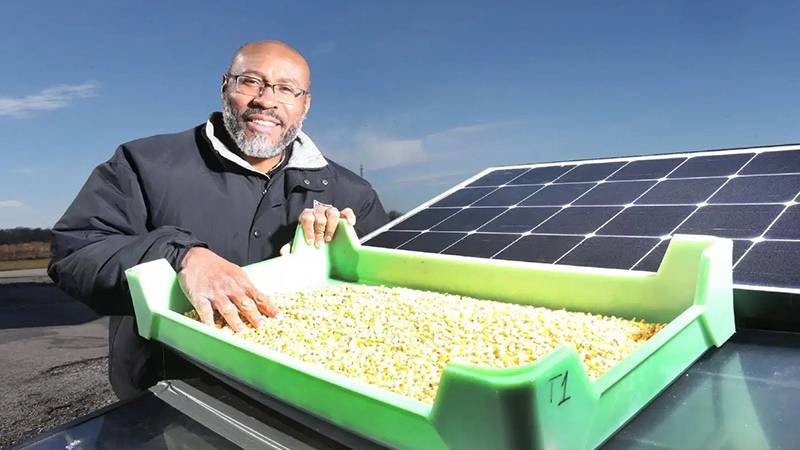Agtech Startup JUA Technologies Receives $600,000 USDA Grant to Develop Solar-Powered Crop Dehydrator
JUA Technologies International, an agriculture technology startup that manufactures solar-powered crop dehydrators, has received a two-year, $600,000 Phase II Small Business Innovation Research (SBIR) grant from the U.S. Department of Agriculture to further develop its technology.
The goal of the Phase II project, titled Smart Multipurpose Solar Dehydration Device for Value Addition to Specialty Crops, is the successful proof of concept toward product-design improvements and design for manufacture of JUA Technologies’ multipurpose solar dryer, called Dehymeleon.
Klein Ileleji is co-founder and CEO/chief technology officer of JUA Technologies. He also is a professor of agricultural and biological engineering and an affiliate of environmental and ecological engineering at Purdue University. He said crop dehydration is one of the best ways to preserve the nutrients and extend the shelf life of food, but it has drawbacks.
“It is an energy-intensive process with huge operating costs because food dehydrators are typically powered by gas, electricity or fuel oil,” Ileleji said. “The high operating cost limits the ability of small and midsize growers and processors in the U.S. to produce dehydrated foods. Small growers and processors are vital to the local foods and urban agriculture industry, which is currently a $1 billion and growing industry in the U.S.
MORE BY GLOBAL AG TECH INITIATIVE
The VISION Conference: Transforming Agriculture Through Innovation and Collaboration
Ground Breaking Podcast Episode #3: How Public and Private Sectors Can Work Together to Reduce the FUD Factor
“In developing countries in the tropics, where postharvest losses of nutrient-rich horticultural produce can be as high as 50%, dehydrating foods hygienically using the abundance of solar energy available in these parts will not only help support nutrition security but also provide growers an opportunity to increase their income from value-added processing.”
Ileleji said dehydrating fruits and vegetables, herbs and spices, and medicinal plants still occurs using primitive, open, sun-drying methods on mats or trays that degrade nutrients and reduce food quality.
“While there are a lot of solar dryer designs available in the literature and online, none of them have been commercialized or utilized in large numbers,” Ileleji said.
Ileleji said JUA Technologies’ proposed high-efficiency, smart, multipurpose solar dehydrator fits the USDA’s and National Institute of Food and Agriculture’s priorities in four ways.
“It improves methods to process specialty crops to improve quality and nutritional value and provide healthy food options,” Ileleji said. “It enables small and midsize growers to add value to their crops and increase their farm income. It provides those same growers with an affordable technology powered by renewable energy, which conserves energy and reduces operation cost. It also provides an energy-efficient technology to promote renewable energy use and support environmental sustainability.”
The grant will cover four research and development goals:
- Modeling and simulation to optimize the solar dehydrator’s performance.
- Determining the behavior and performance of the desiccant and heat-recovery system under various drying loads.
- Determining the field performance and validating the modeling effort for fruits, vegetables, spices and herbs in Indiana and California.
- Beta prototyping of the product for manufacture.
Ileleji said the goals will be addressed by JUA Technologies and contracted manufacturing and product engineering design firms.
In 2019 JUA Technologies received a $100,000 SBIR Phase I grant from the USDA and a $50,000 match from Elevate Ventures. In 2022 the U.S. Small Business Administration recognized Ileleji as the Indiana and the Great Lakes Regional Exporter of the Year for its portable solar dehydrator, Dehytray.
“Both the Dehytray and Dehymeleon technologies spun out from a United States Agency for International Development (USAID)-supported effort called Feed the Future Innovation Lab for Food Processing and Post-Harvest Handling,” Ileleji said. “It was a multi-institutional effort led by Purdue University to reduce postharvest loss, promote economic growth, improve nutrition and enhance food security in Feed the Future target countries.
Ileleji disclosed his crop drying innovation to the Purdue Research Foundation Office of Technology Commercialization, which licensed it to JUA Technologies. The company is a client of the Purdue Foundry, an entrepreneurship and commercialization hub whose professionals help Purdue innovators create startups. Both are managed by the Purdue Research Foundation.









